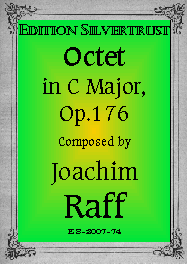Presents
Joachim Raff
String Octet in C Major, Op.176
 During
the last ten years of his life and for the three decades following it, Joachim
Raff (1822-1882) was
regularly mentioned in the
same breath as Wagner, Liszt, and Brahms as one of Germany's leading composers.
The experts and the public judged him to be the equal to such past masters
as Mendelssohn, Schumann and Tchaikovsky.
Incredibly, by the 1920's his music had all but disappeared from the concert
stage. It seems virtually unimaginable that a composer whose talent was
recognized and whose music was admired by Mendelssohn and Liszt, could become a
mere footnote, yet this is what became of Raff and his music for most of the
20th century. Only now is he being rediscovered to the delight of those
fortunate enough to hear his music.
During
the last ten years of his life and for the three decades following it, Joachim
Raff (1822-1882) was
regularly mentioned in the
same breath as Wagner, Liszt, and Brahms as one of Germany's leading composers.
The experts and the public judged him to be the equal to such past masters
as Mendelssohn, Schumann and Tchaikovsky.
Incredibly, by the 1920's his music had all but disappeared from the concert
stage. It seems virtually unimaginable that a composer whose talent was
recognized and whose music was admired by Mendelssohn and Liszt, could become a
mere footnote, yet this is what became of Raff and his music for most of the
20th century. Only now is he being rediscovered to the delight of those
fortunate enough to hear his music.
Raff, who was born near Zurich, basically was self-taught. When Raff sent some of his early compositions to Mendelssohn, the master immediately recognized Raff's talent and arranged for their publication. Unfortunately, Mendelssohn died before he could help Raff much more. The young composer then approached Liszt who also took an interest in him and took him on as his personal secretary and copyist. During the six years he spent with Liszt, Raff became a member of the so-called "New German School" led by Wagner and Liszt. Although he broke from them in 1856, he was still regarded as a Wagnerite by the supporters of Brahms and the other classicists. In short, Raff was in neither camp, but attacked by both. Isolated, he went his own way, paying little attention to the musical politics of late 19th century Germany.
But going his own way was hardly an easy proposition. Nearly starving, for many years Raff was forced to crank out compositions for the commercial market (works that would sell but were of little intrinsic or artistic merit), one after another as fast as he could. Sadly, this was later to tarnish his legacy. After his reputation had faded, he was regarded merely as a composer of parlor pieces, despite the magnificent symphonic and chamber works he left behind. Anyone who has had the time to hear these great works quickly realizes that Raff could be an impeccable craftsman when he had the luxury of time and was not forced to write for the home music-making marketplace.
His String Octet dates from 1872 and is surely one of the best in the literature. The triumphant opening theme of the Allegro, is rhythmically powerful, while the more lyrical second theme gives off an air of mystery. The second movement, Allegro molto, is a short and swift scherzo whose main theme has the propulsion and bounce of a fast horse ride. One is reminded of the scherzo of Schubert's Quintet D.956. Then comes the exquisite and beautiful Andante moderato, which has the quality of a song without words. The finale, Vivace, is a tour d'force. No doubt inspired by Mendelssohn, it has an incredible forward momentum which assumes the quality of a moto perpetuo. The syncopated second theme, in the minor, barely slows down this exciting race to the finish line.
Like most of his works, the octet has been long out of print. Both professionals and amateurs alike will find this a highly attractive work and a welcome addition to their repertoires.
In addition, we are pleased to offer this Octet in a version for 2 Violins, 2 Violas, Cello and Bass. Our bass part was made by Anthony Scelba, noted bass soloist, Professor of Music and Director of the Concert Artists Program of Kean University. In an effort to give bass players a chance to play many of the great works of the chamber music repertoire, Professor Scelba has made several highly acclaimed transcriptions, including one for the Schubert Quintet D.956, which has been recorded.
| (A) Standard (2 Vc) Octet-Parts Only | $49.95 |
|
| (B) Octet with Bass instead of Cello 2-Parts Only | $49.95 |
|
| (C) Octet-All 9 Parts | $59.95 |
|